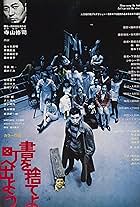

Based on the homonymous collection of poems by Shuji Terayama, “Pastoral: To Die in the Country” is an autobiographical movie that, once more in a work of both the director and Atg, stretches the medium of cinema to its extremes, through an approach that is abstract, surrealistic, avant-garde, theatrical and meta, to name just a few of the elements that consist its narrative.
on Amazon by clicking on the image below
Shin-chan is a 15-years-old boy who lives with his mother in Aomori Prefecture, at the foot of the Scary Mountain, where his father is buried. The young man lusts for the woman next door, to the anger of her husband and the annoyance of his mother, whom Shin-chan has no issue talking about even his most inner sexual thoughts. One day, he witnesses a woman in the village giving birth to a baby, but soon learns...
on Amazon by clicking on the image below
Shin-chan is a 15-years-old boy who lives with his mother in Aomori Prefecture, at the foot of the Scary Mountain, where his father is buried. The young man lusts for the woman next door, to the anger of her husband and the annoyance of his mother, whom Shin-chan has no issue talking about even his most inner sexual thoughts. One day, he witnesses a woman in the village giving birth to a baby, but soon learns...
- 9/4/2023
- by Panos Kotzathanasis
- AsianMoviePulse


by Swapnil Dhruv Bose
One of the most striking films to have come out of the Japanese New Wave, “Throw Away Your Books, Rally in the Streets” is avant-garde writer turned filmmaker Shūji Terayama’s debut feature and is based on his eponymous book. Although he went on to make other masterpieces like “Pastoral: To Die in the Country” (1974) and “Glass Labyrinth” (1979), this brilliant work of experimental anarchy remains the apotheosis of Terayama’s unapologetically original artistic vision.
Following in the footsteps of Jean-Luc Godard and anticipating the non-linear surrealness of directors like David Lynch, Terayama constructs unforgettable vignettes which blind the viewer with their pathos. It is almost pointless to talk about the film’s plot because time and causality are rendered insignificant when confronted with the underlying spiritual anguish. The protagonist introduces himself to us in a spectacular opening monologue where he stares straight into...
One of the most striking films to have come out of the Japanese New Wave, “Throw Away Your Books, Rally in the Streets” is avant-garde writer turned filmmaker Shūji Terayama’s debut feature and is based on his eponymous book. Although he went on to make other masterpieces like “Pastoral: To Die in the Country” (1974) and “Glass Labyrinth” (1979), this brilliant work of experimental anarchy remains the apotheosis of Terayama’s unapologetically original artistic vision.
Following in the footsteps of Jean-Luc Godard and anticipating the non-linear surrealness of directors like David Lynch, Terayama constructs unforgettable vignettes which blind the viewer with their pathos. It is almost pointless to talk about the film’s plot because time and causality are rendered insignificant when confronted with the underlying spiritual anguish. The protagonist introduces himself to us in a spectacular opening monologue where he stares straight into...
- 1/27/2021
- by Guest Writer
- AsianMoviePulse
An important event of the 19th New Horizons festival will be Poland’s first retrospective of works by Terayama Shūji (1935-1983), one of the most prominent avant-garde reformers of Japanese cinema and theater.
Selected filmography:
Short films
1964 Ori / Kanshū (The Cage / Klatka / Więzień w klatce)
1971 Tomato Kecchappu Kōtei (Emperor Tomato Ketchup / Cesarz Tomato Ketchiup)
1974 Chōfuku-ki (Butterfly Dress Pledge / Motyl)
1974 Seishōnen no tame no eiga nyūmon (The young people’s guide to film / Wstęp dla młodzieży do wiedzy o filmie)
1974 Rōra (Laura / Laura)
1975 Shinpan (The Trial / Proces)
1975 Hōsō-tan (A Tale of Smallpox / Opowieść o ospie)
1977 Marudororu no uta (Les Chants de Maldoror / Pieśni Maldorora)
1979 Kusa meikyū (Grass Labyrinth / Labirynt Traw)
Features films
1971 Sho o suteyo machi e deyō (Throw Away Your Books, Rally in the Streets / Rzućmy książki, wyjdźmy na ulice!)
1974 Den’en ni shisu (Pastoral: To Die in the Country <aka Pastoral Hide and Seek> / Wiejska ciuciubabka)
1977 Bokusā (Boxer / Bokser)
1981 Shanhai Ijin Shōkan (Fruits of Passion...
Selected filmography:
Short films
1964 Ori / Kanshū (The Cage / Klatka / Więzień w klatce)
1971 Tomato Kecchappu Kōtei (Emperor Tomato Ketchup / Cesarz Tomato Ketchiup)
1974 Chōfuku-ki (Butterfly Dress Pledge / Motyl)
1974 Seishōnen no tame no eiga nyūmon (The young people’s guide to film / Wstęp dla młodzieży do wiedzy o filmie)
1974 Rōra (Laura / Laura)
1975 Shinpan (The Trial / Proces)
1975 Hōsō-tan (A Tale of Smallpox / Opowieść o ospie)
1977 Marudororu no uta (Les Chants de Maldoror / Pieśni Maldorora)
1979 Kusa meikyū (Grass Labyrinth / Labirynt Traw)
Features films
1971 Sho o suteyo machi e deyō (Throw Away Your Books, Rally in the Streets / Rzućmy książki, wyjdźmy na ulice!)
1974 Den’en ni shisu (Pastoral: To Die in the Country <aka Pastoral Hide and Seek> / Wiejska ciuciubabka)
1977 Bokusā (Boxer / Bokser)
1981 Shanhai Ijin Shōkan (Fruits of Passion...
- 7/20/2019
- by Rhythm Zaveri
- AsianMoviePulse
IMDb.com, Inc. takes no responsibility for the content or accuracy of the above news articles, Tweets, or blog posts. This content is published for the entertainment of our users only. The news articles, Tweets, and blog posts do not represent IMDb's opinions nor can we guarantee that the reporting therein is completely factual. Please visit the source responsible for the item in question to report any concerns you may have regarding content or accuracy.
